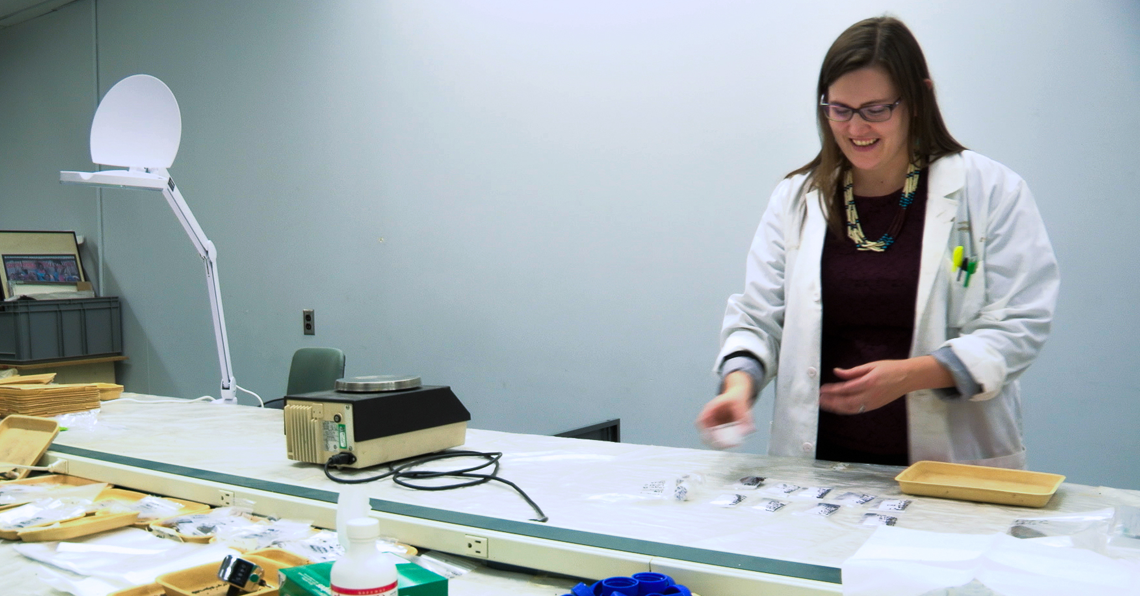Indigenous Approaches to an Archeological Field School with Dr. Kisha Supernant
Using Indigenous and experiential approaches to teaching and learning, Dr. Supernant engages students in a local field school and discovers that her own ancestral connection to the land becomes a powerful pedagogical tool.
Can you Tell Me How You Came To Teaching? How Did You Get To Where You Are Now?
I care deeply about teaching and about my students. I view teaching as an opportunity to reach a diverse group of learners and provide them with the chance to think differently about the world and their place within it. I find teaching to be a challenge and a responsibility, but also a lot of fun. Watching students get excited about the material that I teach is deeply satisfying and drives me to continue to find new and diverse ways to allow students to engage in the learning process and to challenge them to step outside their comfort zones to find new understandings. Over the past few years, I have come to realize that teaching in a university environment provides a unique challenge both for the instructor and the students at different levels and in different learning environments. I continue to develop my ability to negotiate the various dynamics in the classroom, to hold students to high standards of achievement, and to support students to reach the learning goals of the class. My pedagogy is currently evolving as I explore ways to bring Indigenous perspectives and ways of knowing to a discipline that has treated Indigenous peoples as the object of study and positioned white academics as the rightful stewards of Indigenous pasts.
"For me this is really personal as well because I am Métis and my relatives would have been at these places. […] I realized how powerful that could be for [students] as a pedagogical tool."
-Kisha Supernant
My goal in the classroom is to facilitate both instruction and learning by being approachable, knowledgeable, challenging, and enthusiastic about the material I teach. Learning in a university environment can be a difficult process for some students, and although I expect students to take responsibility for their own education, I also strongly believe it should be the instructor's goal to construct a positive atmosphere, allow students to take an active role in the learning process, and to provide opportunities for different learning styles. When I teach, I strive to create inclusive spaces, where I acknowledge that we all bring our own knowledge and experiences to the table and that we are all whole people with lives outside the classroom. I ask students to come to the classroom with a commitment to respectful engagement and dialogue and I try to model this behavior in my teaching practice.
Over the past 10 years, I have taken workshops to help develop my pedagogical skills and have developed new courses in a variety of settings, from large introductory lectures to small graduate seminars. My approach to teaching is to encourage students to actively engage with the course material, even in large classes, through discussion and in-class activities. Two main themes that run through all my courses are an emphasis on critical thinking (at all course levels) and developing skills that have a tangible, real-world outcome. When students complete one of my courses, I want them to have had the opportunity to learn about themselves and their place within a global, human world, past, present, and future.

"As much as possible when we're doing field schools we try to have Indigenous community members working with us, if that's something the community wants."
-Kisha Supernant
About Dr. Kisha Supernant
Dr. Kisha Supernant is Métis and an Associate Professor of Anthropology at the University of Alberta. An award-winning teacher and writer, she is committed to translating her research work to broad audiences, whether through the university classroom or through public outreach. Her research with Indigenous communities in Canada explores how archaeologists and communities can build collaborative research relationships. Her research interests include the relationship between cultural identities, landscapes, and the use of space, Métis archaeology, and heart-centered archaeological practice. She specializes in the application of mapping methods to the human past and present, including the role of digital mapping and GIS spatial analysis in archaeological research. Her current research project, Exploring Métis Identity Through Archaeology (EMITA), takes a relational approach to exploring the material past of Métis communities, including her own family, in western Canada. She has published in journals on GIS in archaeology, collaborative archaeological practice, indigenous archaeology, and conceptual mapping in digital humanities.
Awards
Cécile E. Mactaggart Travel Award for Narrative Writing, 2018 Provost's Award for Early Achievement of Excellence in Undergraduate Teaching, 2016 Faculty of Arts Undergraduate Teaching Award (Early Achievement), 2015
Want To Learn More About Experiential Learning?
Battiste, M. (2017). Decolonizing Education: Nourishing the Learning Spirit. Vancouver, BC: UBC Press.
Kolb, D. A. (2015). Experiential Learning: Experience as the source of learning and development. New Jersey: Pearson Education.
McCoy, K., Tuck, E. & McKenzie, M. (Eds.) (2016). Land Education: Rethinking pedagogies of place from Indigenous, postcolonial and decolonizing perspectives. New York: Routledge.